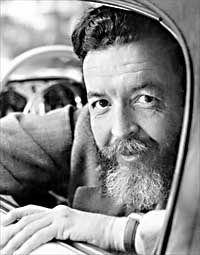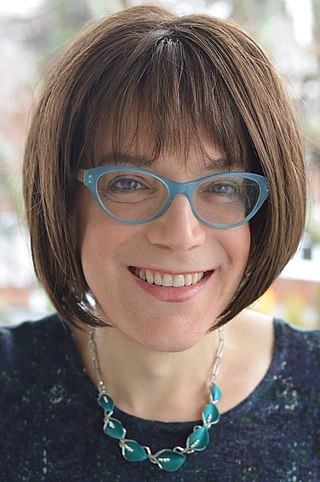Related Research Articles

William Carlos Williams was an American poet, writer, and physician closely associated with modernism and imagism.

George Oppen was an American poet, best known as one of the members of the Objectivist group of poets. He abandoned poetry in the 1930s for political activism and moved to Mexico in 1950 to avoid the attentions of the House Un-American Activities Committee. He returned to poetry—and to the United States—in 1958, and received the Pulitzer Prize for Poetry in 1969.
The Language poets are an avant-garde group or tendency in United States poetry that emerged in the late 1960s and early 1970s. The poets included: Bernadette Mayer, Leslie Scalapino, Stephen Rodefer, Bruce Andrews, Charles Bernstein, Ron Silliman, Barrett Watten, Lyn Hejinian, Tom Mandel, Bob Perelman, Rae Armantrout, Alan Davies, Carla Harryman, Clark Coolidge, Hannah Weiner, Susan Howe, James Sherry, and Tina Darragh.

Rae Armantrout is an American poet generally associated with the Language poets. She has published ten books of poetry and has also been featured in a number of major anthologies. Armantrout currently teaches at the University of California, San Diego, where she is Professor of Poetry and Poetics. On March 11, 2010, Armantrout was awarded the 2009 National Book Critics Circle Award for her book of poetry Versed published by the Wesleyan University Press, which had also been nominated for the National Book Award. The book later earned the 2010 Pulitzer Prize for Poetry. She is the recipient of numerous other awards for her poetry, including an award in poetry from the Foundation for Contemporary Arts in 2007 and a Guggenheim Fellowship in 2008.

Charles Bernstein is an American poet, essayist, editor, and literary scholar. Bernstein is the Donald T. Regan Professor, Emeritus, Department of English at the University of Pennsylvania. He is one of the most prominent members of the L=A=N=G=U=A=G=E or Language poets. In 2006 he was elected a Fellow of the American Academy of Arts and Sciences. and in 2019 he was awarded the Bollingen Prize from Yale University, the premiere American prize for lifetime achievement, given on the occasion of the publication of Near/Miss. Bernstein was David Gray Professor of Poetry and Poetics at SUNY-Buffalo from 1990 to 2003, where he co-founded the Poetics Program. A volume of Bernstein's selected poetry from the past thirty years, All the Whiskey in Heaven, was published in 2010 by Farrar, Straus, and Giroux. The Salt Companion to Charles Bernstein was published in 2012 by Salt Publishing.

Harold Hart Crane was an American poet. Provoked and inspired by T. S. Eliot, Crane wrote modernist poetry that was difficult, highly stylized, and ambitious in its scope. In his most ambitious work, The Bridge, Crane sought to write an epic poem, in the vein of The Waste Land, that expressed a more optimistic view of modern, urban culture than the one that he found in Eliot's work. In the years following his suicide at the age of 32, Crane has been hailed by playwrights, poets, and literary critics alike, as being one of the most influential poets of his generation.
Jeremy Halvard Prynne is a British poet closely associated with the British Poetry Revival.

Randall Jarrelljə-REL was an American poet, literary critic, children's author, essayist, and novelist. He was the 11th Consultant in Poetry to the Library of Congress—a position that now bears the title Poet Laureate of the United States.

Carolyn D. Wright was an American poet. She was a MacArthur Fellow, a Guggenheim Fellow, and the Poet Laureate of Rhode Island.

Archibald Randolph Ammons was an American poet who won the annual National Book Award for Poetry in 1973 and 1993.
Flarf poetry was an avant-garde poetry movement of the early 21st century. The term Flarf was coined by the poet Gary Sullivan, who also wrote and published the earliest Flarf poems. Its first practitioners, working in loose collaboration on an email mailing list, used an approach that rejected conventional standards of quality and explored subject matter and tonality not typically considered appropriate for poetry. One of their central methods, invented by Drew Gardner, was to mine the Internet with odd search terms then distill the results into often hilarious and sometimes disturbing poems, plays and other texts.
Kent Johnson was an American poet, translator, critic, and anthologist. His work, much of it meta-fictional and/or satirical in approach, has provoked a notable measure of controversy and debate within English-language poetry circles.

Anthony Dey Hoagland was an American poet. His poetry collection, What Narcissism Means to Me (2003), was a finalist for the National Book Critics Circle Award. His other honors included two grants from the National Endowment for the Arts, a 2000 Guggenheim Fellowship in Poetry, and a fellowship to the Provincetown Fine Arts Work Center. His poems and criticism have appeared in such publications as Poetry Magazine, Ploughshares, AGNI, Threepenny Review, The Gettysburg Review, Ninth Letter, Southern Indiana Review, American Poetry Review and Harvard Review.
Joan Houlihan is an American poet. She is the author of six books, most recently It Isn't a Ghost if it Lives in Your Chest, winner of the 2021 Julia Ward Howe Award. Her other books are Shadow-feast, described by the Los Angeles Review as "...a tour de force sheared of excess, breathtaking in its leaps, and thrilling in its sonic resonances"; The Us described by Lucie Brock-Broido as: "...like nothing I have ever read or seen...wildly hewn, classically construed and skewed by an imagined lexicon.…both syntactically inventive and radically simple"; Ay, the sequel to The Us, described by Ilya Kaminsky as "breathtakingly inventive and yet deeply humane...a narrative and song at once; it is talismanic"; The Mending Worm, winner of the 2005 Green Rose Prize in Poetry, and Hand-Held Executions: Poems & Essays which includes her series of essays on contemporary American poetry called The Boston Comment. The essays drew a great deal of attention for their criticism of both traditional and what she termed "post-avant" poetry, occasioning responses from Fred Moramarco of Poetry International and a wide range of letters from the poetry community both favorable and critical
Susan Wheeler is an educator and award-winning poet whose poems have frequently appeared in anthologies. She is currently the Director of Creative Writing at Princeton University. She has also taught at University of Iowa, NYU, Rutgers, Columbia University and The New School.

Mohammed Bennis is a Moroccan poet and one of the most prominent writers of modern Arabic poetry. Since the 1970s, he has enjoyed a particular status within Arab culture. Muhsin J al-Musawi states that "Bennis’ articulations tend to validate his poetry in the first place, to encapsulate the overlapping and contestation of genres in a dialectic, that takes into account power politics whose tropes are special. As a discursive threshold between Arab East and the Moroccan West, tradition and modernity, and also a site of contestation and configuration, Muhammad Bennis' self-justifications may reveal another poetic predilection, too."
Kristin Prevallet is an American poet, essayist, and teacher. Her poetic work incorporates conceptual writing and trance, and her performances are rooted in feminist performance art and spoken word. Everywhere Here and in Brooklyn, I, Afterlife: Essay in Mourning Time, and Trance Poetics are among her poetic books.
Gabriel Gudding is an American poet, essayist, and translator.

Stephanie Burt is a literary critic and poet who is Professor of English at Harvard University. The New York Times has called her "one of the most influential poetry critics of [her] generation". Burt grew up around Washington, D.C. She has published various collections of poetry and a large amount of literary criticism and research. Her work has appeared in The New Yorker,The New York Times Book Review, The London Review of Books, The Times Literary Supplement, The Believer, and The Boston Review.

Max Ritvo was an American poet. Milkweed Editions posthumously published a full-length collection of his poems, Four Reincarnations, to positive critical reviews. Milkweed published Letters from Max and a second collection of Ritvo's poems, The Final Voicemails, in September 2018.
References
- ↑ Burt, Stephanie (September 1998), "Burt Reviews Wheeler's "Smokes"", Boston Review
- ↑ "American Letters & Commentary: 11". American Letters & Commentary. Retrieved 2007-07-21.
- ↑ "Poetry Criticism: What is it for?". Poetry Society. Archived from the original on 2007-07-17. Retrieved 2007-07-21.
- ↑ Hoagland, Tony (March 2006), "Fear of Narrative and the Skittery Poem of Our Moment", Poetry Magazine
- ↑ Johnson, Kent (December 2001), "Looking for "one untranslatable song"", Jacket Magazine
- ↑ Burt, Stephanie (May 2009), "The New Thing", Boston Review